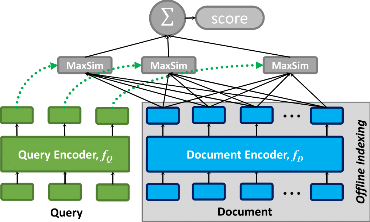PLAID: An Efficient Engine for Late Interaction Retrieval
Pre-trained language models are increasingly important components across multiple information retrieval (IR) paradigms. Late interaction, introduced with the ColBERT model and recently refined in ColBERTv2, is a popular paradigm that holds state-of-the-art status across many benchmarks. To dramatically speed up the search latency of late interaction, we introduce the Performance-optimized Late Interaction Driver (PLAID). Without impacting quality, PLAID swiftly eliminates low-scoring passages using a novel centroid interaction mechanism that treats every passage as a lightweight bag of centroids. PLAID uses centroid interaction as well as centroid pruning, a mechanism for sparsifying the bag of centroids, within a highly-optimized engine to reduce late interaction search latency by up to 7$\times$ on a GPU and 45$\times$ on a CPU against vanilla ColBERTv2, while continuing to deliver state-of-the-art retrieval quality. This allows the PLAID engine with ColBERTv2 to achieve latency of tens of milliseconds on a GPU and tens or just few hundreds of milliseconds on a CPU at large scale, even at the largest scales we evaluate with 140M passages.
PDF Abstract



 Natural Questions
Natural Questions
 MS MARCO
MS MARCO